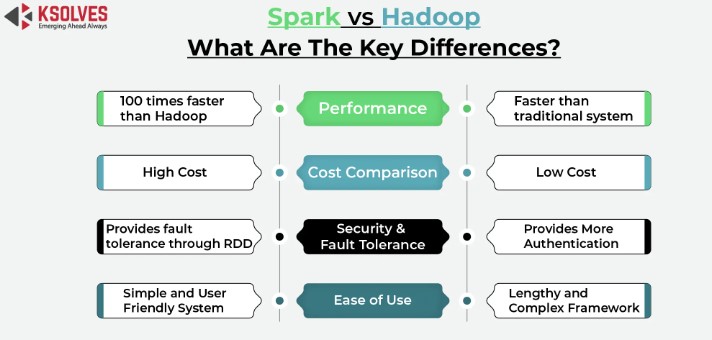Hadoop and Spark are two of the most popular big data processing frameworks. Both of these frameworks are open-source and designed to handle large and complex data sets. However, there are differences between the two, and choosing the right tool for your big data needs can be challenging. In this article, we will compare Hadoop and Spark and help you choose the right tool for your big data needs.
Hadoop
Hadoop is an open-source software framework for distributed storage and processing of large data sets. It is one of the most popular big data tools and is used by many large companies. Hadoop has two main components: Hadoop Distributed File System (HDFS) for storage and MapReduce for processing.
Hadoop is designed to handle batch processing of large data sets. It is optimized for sequential access to large files and can handle large data sets that are too big to fit into memory. Hadoop is also designed to be fault-tolerant and can recover from node failures.
Spark
Spark is another open-source big data processing framework. It is designed to be faster and more flexible than Hadoop, and it can process data in-memory. Spark can be used for a wide range of big data processing tasks, including machine learning, graph processing, and streaming data analysis.
Spark is designed to handle both batch processing and real-time processing of large data sets. It can be used for iterative algorithms and can handle data that is too large to fit into memory. Spark is also designed to be fault-tolerant and can recover from node failures.
Choosing the Right Tool
When choosing between Hadoop and Spark, there are several factors to consider. Here are some key considerations:
- Data size and processing needs: If you have large data sets that are too big to fit into memory and need batch processing, Hadoop may be the better choice. If you need real-time processing or have smaller data sets that can fit into memory, Spark may be the better choice.
- Ease of use: Spark is generally considered to be easier to use than Hadoop. Spark has a more user-friendly interface and a shorter learning curve.
- Cost: Both Hadoop and Spark are open-source and free to use. However, commercial versions of both frameworks are available that may require payment for enterprise-level support or additional features.
- Performance: Spark is generally faster than Hadoop due to its in-memory processing capabilities. However, Hadoop can handle larger data sets that are too big to fit into memory.
Conclusion
Hadoop and Spark are both powerful big data processing frameworks. When choosing between the two, it is important to consider factors like data size, processing needs, ease of use, cost, and performance. The framework that is right for your big data needs will depend on your specific requirements and use case.
FAQs
- What is Hadoop? Hadoop is an open-source software framework for distributed storage and processing of large data sets. It is one of the most popular big data tools and is used by many large companies.
- What is Spark? Spark is another open-source big data processing framework. It is designed to be faster and more flexible than Hadoop, and it can process data in-memory.
- Can Hadoop handle real-time processing? Hadoop is designed for batch processing of large data sets. While it can handle some real-time processing, it is not optimized for real-time data analysis.
- Can Spark handle batch processing? Yes, Spark can handle batch processing of large data sets, as well as real-time processing.
- Which is easier to use, Hadoop or Spark? Spark is generally considered to be easier to use than Hadoop due to its more user-friendly interface
- Can Hadoop and Spark be used together? Yes, Hadoop and Spark can be used together. Spark can be run on top of Hadoop and can use Hadoop’s distributed file system (HDFS) for storage.
- Which is more cost-effective, Hadoop or Spark? Both Hadoop and Spark are open-source and free to use. However, commercial versions of both frameworks are available that may require payment for enterprise-level support or additional features.
- What are some advantages of using Hadoop? Hadoop is designed to handle batch processing of large data sets and is optimized for sequential access to large files. It is also fault-tolerant and can recover from node failures.
- What are some advantages of using Spark? Spark is designed to be faster and more flexible than Hadoop and can process data in-memory. It can be used for a wide range of big data processing tasks, including machine learning, graph processing, and streaming data analysis.
- Which framework is right for my big data needs? The framework that is right for your big data needs will depend on your specific requirements and use case. Consider factors like data size, processing needs, ease of use, cost, and performance when choosing between Hadoop and Spark.
Read More :
- Big Data Management : The Must-Have Tools for Data Cleaning and Preparation
- The Best Open Source Tools for Big Data Analysis
- Big Data Analytics Made Easy : An Introduction to Popular Tools
